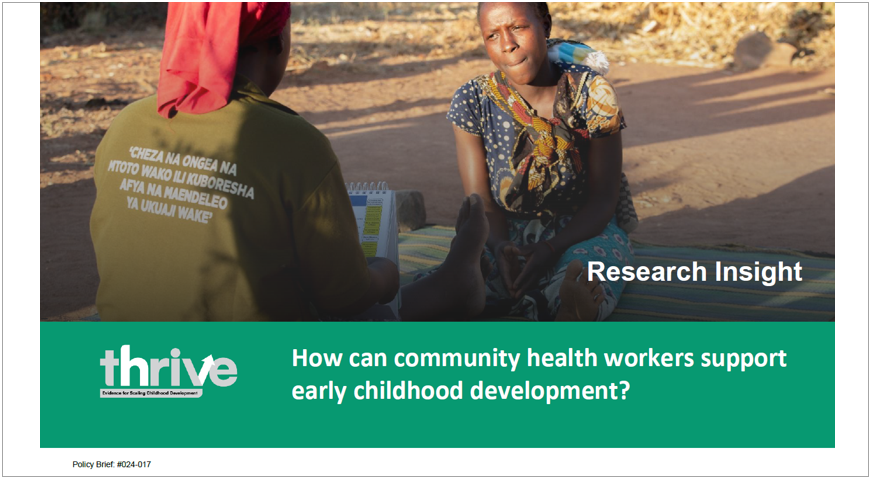
DIGITAL HEALTH: Smartphones can empower community health workers to improve child development outcomes

In a world where technology shapes every aspect of our lives, community health workers can be empowered to step into the digital age, armed with smartphones and mobile apps to enhance caregiving practices, leading to improved health and development outcomes for children.
New findings from a latest review by Farida Katunzi from Ifakara Health Institute and Kate Gooding from Oxford Policy Management, highlights the essential role of community health workers (CHWs) in enhancing caregiving practices in the early childhood development space.
Published on Thrive, the review outlines key strategies, challenges, and recommendations for scaling up CHW programs to improve child health outcomes. Central to the discussion is the "Kizazi Kijacho" (Swahili for "The Next Generation") research program, which is currently being implemented in Tanzania with a strong focus on its sustainability and long-term impact.
Farida and Kate say, research shows that these tools not only empower health workers but also resonate with the communities they serve, making services more accessible and efficient. “Smartphones and other digital apps can help community health workers to provide services… such technology is often appreciated.”
However, the path to digital transformation isn’t without its challenges. Technical glitches, concerns about data privacy, and potential disruptions in personal interactions pose hurdles that must be navigated carefully.
“As community health workers embrace this new frontier, they are not just improving healthcare—they’re redefining it,” the authors argue in their report of the findings.
Kizazi Kijacho program
The Kizazi Kijacho program is being carried out by the Institute for International Economic Studies (IIES), Yale University, University of Chile, FAIR (NHH Norwegian School of Economics) and Ifakara Health Institute (IHI), in collaboration with implementing partners D-tree International, Elizabeth Glaser Pediatric AIDS Foundation (EGPAF) and EDI Global.
Implemented in Dodoma region, the program involves 3,588 pregnant mothers and their families living across 387 communities and served by 258 health dispensaries in eight districts. Government CHWs conduct monthly home visits, offering counseling, health advice, and early learning stimulation from pregnancy until the child is about two years old. Digital tools are used to track progress and strengthen caregiver engagement.
The program aims to inform Early Childhood Development (ECD) policy and practice in Tanzania by testing three intervention packages designed to support parenting and child development outcomes from conception to age two. These include a parenting program delivered by CHWs, an unconditional cash transfer that provides financial support to households, and a combination of both.
Learn more about Kizazi Kijacho program here.
Other key findings on the role of CHWs in ECD
The review identifies several key insights, including the challenges CHWs face in supporting ECD. While CHWs have been effective in supporting nurturing care, they still face difficulties.
For instance, CHWs sometimes struggle to advise parents on responsive care aspects, like communication and how to play with children. Limited involvement of fathers in caregiving was noted, often due to the perception that child health and nutrition are primarily a woman's responsibility.
Additionally, practical barriers – such as work schedules conflicting with counseling sessions – hinder men’s participation, with some CHWs not making enough effort to involve fathers in counseling sessions.
The review also underscores that CHWs need a range of support to perform their roles effectively. This includes adequate training, fair financial remuneration and other incentives, and building strong relationships with both other healthcare workers and the communities they serve.
Impact of review in the future
The authors note that the process evaluation reflects many of the same themes from the other literature remarking, “Our process evaluation is now complete, and we have seen many of the themes highlighted in the existing literature – such as the importance of community support and trust, effective supervision, and the benefits and drawbacks of mobile health technologies.”
They underline that the findings from the review will contribute to the growing evidence on the role of CHWs in ECD set to be published later in 2024.
“The process evaluation will add to current evidence on the role of community health workers in early childhood development, including community health workers’ experience of engaging fathers, their confidence in advising on responsive caregiving, and their motivation and training; relationships between community health workers and communities; and wider community health worker performance,” the authors concluded.
Read the policy brief here.
About ECD
Early Childhood Development (ECD) refers to the growth of a child’s body, brain, emotions, and social skills from birth up to 8 years. This stage is important, as up to 90% of brain development occurs by age five, influencing learning, behavior, and health throughout life. and sustainable delivery of high-quality ECD services at scale through community health workers.
Both UNICEF and WHO emphasize the significant role of ECD in shaping individuals and society. A global report, co-published by UNESCO and UNICEF in June 2024, on Early Childhood Care and Education, underscores the importance of investing early in a child’s formative years.
The report explores how children learn and develop and highlights the role of key actors in children's environments – parents, families, educators, and the community – who can be supported through public policies and social programs to improve children’s learning and well-being.
